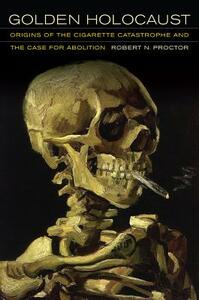You need to sign in or sign up before continuing.
Take a photo of a barcode or cover
2 reviews for:
Golden Holocaust: Origins of the Cigarette Catastrophe and the Case for Abolition
Robert N. Proctor
2 reviews for:
Golden Holocaust: Origins of the Cigarette Catastrophe and the Case for Abolition
Robert N. Proctor
I found my way to this book by way of several positive references in the very good League of Denial by Mark Fainaru-Wada and Steve Fainaru https://www.goodreads.com/book/show/18813484-league-of-denial
Golden Holocaust reminds me of League of Denial in that it can be seen as a book about a particular industry but it can also be viewed as a more general book on business ethics or unethical businesses. The writing can feel a bit academic once in a while but overall it’s a highly readable and often very funny book (in a biting, sarcastic way). I read the kindle version and highlighted many passages.
If I were to rate this book strictly on the reading experience (which is typically my primary standard) I would go somewhere between 3 and 4 stars. It’s a long book and not one I would pick up and stay with for the fun of it. I doubt this is a book that will be widely read because I’m not sure who the target audience is. Plaintiff attorneys and business school students are a definite niche. This isn’t the kind of book to get a smoker to quit and I just don’t see pre-smokers reading it.
The strength here is the content. The author thoroughly addresses the health risks without resorting to gory language or images and goes well beyond this to challenge the ethics of the cigarette industry, the media, the legal & marketing professions and academia. He calls out colleagues from Stanford (where the author is on the faculty) and particular faculty members at other elite universities (Duke, Harvard, Yale, UCLA) among others. The author makes powerful arguments and stands firmly behind them.
The author goes into great detail on the cigarette industry’s tactics to confuse and muddle the emerging science on the dangers of tobacco use; its own internal findings on addiction and health risks; its use of scientific funding to gain public favor and distort medical evidence against tobacco (most notably in court); the science of cigarettes (what’s in a cigarette; how nicotine and tar levels can be manipulated; the fraud of filters; what’s in smoke, etc.); its continuing use of marketing and lobbying to lure pre-smokers into the trap of smoking addiction. There are many other aspects to this book that make it a tough but worthwhile read.
Golden Holocaust reminds me of League of Denial in that it can be seen as a book about a particular industry but it can also be viewed as a more general book on business ethics or unethical businesses. The writing can feel a bit academic once in a while but overall it’s a highly readable and often very funny book (in a biting, sarcastic way). I read the kindle version and highlighted many passages.
If I were to rate this book strictly on the reading experience (which is typically my primary standard) I would go somewhere between 3 and 4 stars. It’s a long book and not one I would pick up and stay with for the fun of it. I doubt this is a book that will be widely read because I’m not sure who the target audience is. Plaintiff attorneys and business school students are a definite niche. This isn’t the kind of book to get a smoker to quit and I just don’t see pre-smokers reading it.
The strength here is the content. The author thoroughly addresses the health risks without resorting to gory language or images and goes well beyond this to challenge the ethics of the cigarette industry, the media, the legal & marketing professions and academia. He calls out colleagues from Stanford (where the author is on the faculty) and particular faculty members at other elite universities (Duke, Harvard, Yale, UCLA) among others. The author makes powerful arguments and stands firmly behind them.
The author goes into great detail on the cigarette industry’s tactics to confuse and muddle the emerging science on the dangers of tobacco use; its own internal findings on addiction and health risks; its use of scientific funding to gain public favor and distort medical evidence against tobacco (most notably in court); the science of cigarettes (what’s in a cigarette; how nicotine and tar levels can be manipulated; the fraud of filters; what’s in smoke, etc.); its continuing use of marketing and lobbying to lure pre-smokers into the trap of smoking addiction. There are many other aspects to this book that make it a tough but worthwhile read.
A social history of tobacco industry. Well sourced, an socio historical investigation into the root of cigarette

